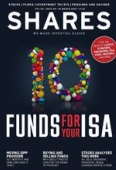Archived article
Please note that tax, investment, pension and ISA rules can change and the information and any views contained in this article may now be inaccurate.
Welcome to the ‘fundraising’ fund which invests when companies need cash

Have you ever been frustrated at not being able to participate in discounted share placings or IPOs (initial public offerings)? If so, we’ve spotted a potential solution in the form of a UK equity fund which only makes investments in these circumstances. The fund in question is MFM UK Primary Opportunities Fund (GB00B8HGN522).
Being able to buy discounted shares doesn’t necessarily mean each opportunity is a good investment. Using the services of a fund manager can have an advantage as you benefit from their skills and experience in being able to spot the best and avoid the worst opportunities.
However, fund managers don’t always get it right and as such you should never assume their decisions will always result in a profit.
So has MFM UK Primary Opportunities delivered decent returns? Its performance has been getting better since 2015, beating the FTSE All-Share in two out of the past three years.
It generated 7.6% total return in 2015 (FTSE All-Share: 1%) and 19.4% in 2017 (FTSE All-Share: 13.1%). Even the ‘lagging’ year was still a success in investment terms, delivering 14% return in 2016, just shy of the FTSE All-Share’s 16.8% gain.
So far in 2018 it is outperforming the market, up 0.6% to 31 January versus a 1.9% decline in the benchmark index. We’ll take a closer look at the portfolio later in the article. First it is worth discussing the retail investor’s position in the world of fundraising.
HOW CAN RETAIL INVESTORS PARTICIPATE IN FUNDRAISINGS?
The most well-known methods for you to take part in a fundraise are rights issues and open offers, although there aren’t that many events in a typical year compared to the frequency of share placings. The latter are generally restricted to institutional investors – more on this in a minute.
Rights issues are restricted to existing shareholders and generally give you the chance to buy shares at a steep discount. Open offers are open to anyone and you’ll probably have a smaller discount.
A select few companies offer the public the chance to participate in an IPO, buying shares at the IPO offer price.
PrimaryBid is among the service providers which let retail investors take part in share placings, although these tend to only be offers involving small companies.
Members of the public classified as ‘sophisticated investors’ are sometimes invited to take part in placings or a broader range of IPOs.
INSTITUTIONAL INVESTORS’ ADVANTAGE
Fund managers, pension funds and other institutional investors often have an advantage over retail investors in being able to buy cut-price shares in companies. This generally involves a company ‘placing’ new shares with investors in exchange for cash.
This typically happens when companies want money principally for acquisitions or to strengthen their balance sheet.
Share placings tend to be priced at a small discount to the market value, to give the investors the incentive to hand over potentially large sums of money.
Most placings tend to be done in private and are only announced once the money is raised. Corporate financiers find it easier to call their network of institutional investor contacts to raise money rather than go to the effort of involving the general public.
Institutional investors occasionally have the chance to buy discounted shares when a company director or an existing shareholder wants to offload a large chunk of stock.
WELCOME TO THE FUNDRAISING FUND
So how does MFM UK Primary Opportunities Fund fit into the equation? It is classified as an institutional investor. Fund manager Oliver Brown looks to buy companies below fair value or the prevailing market price.
For example, it recently bought shares in e-commerce specialist Clipper Logistics (CLG) at a 7% discount to the market price when the executive chairman sold a chunk of his personal holding. And the fund also invested in Duke Royalty (DUKE:AIM) at a near-5% discount as part of a £20m placing to raise new cash to make royalty investments.
Brown believes investing in IPOs could potentially deliver 10% to 20% return in the first year; other situations are less predictable.
The point at which he sells an investment depends on a range of different factors. He may reduce the holding as the share price moves up on subsequent news events or he may start selling if it achieves new share price highs.
Finding new opportunities also encourages the fund manager to review the portfolio regularly to see which holdings could be reduced or sold outright to create cash to fund new investments.
HIGHER RISK TRADES
Recent purchases include TalkTalk (TALK) as part of a £200m share placing. ‘It’s not the highest quality company, yet the new money will help to reduce debt and fund infrastructure investment,’ says Brown. ‘The company also cut its dividend which will save some money.’
Coinciding with the fundraising was a trading update so Brown says he was able to make a decision about the placing knowing the latest facts about the business. ‘We’re buying into a company in a better financial position.’
TalkTalk has been a serial disappointment to investors and has a tendency to miss expectations. As such, Brown believes it would only have to deliver an ‘in line with expectations’ statement at the next trading update in order for the share price to see ‘a decent bounce’. He says that’s the point at which he may consider selling.
Such an approach may come across as short-term trading, yet the fund manager insists his strategy isn’t only about getting in low and getting out fast.
SOLID BACKBONE
Part of the portfolio contains stakes in large companies such as HSBC (HSBA) and Royal Dutch Shell (RDSB). He says these positions provide stability and income to the portfolio.
The HSBC stake was acquired in 2009 when it undertook a £12.5bn rights issue at 254p. Today the bank’s shares trade three times higher at 760.5p.
Interestingly, the fund doesn’t take part in rights issues at the placing price. Instead, it picks up some of the ‘rump’, being shares not taken up by qualifying shareholders.
It is rare for 100% of a rights issue to be fully taken up by shareholders. A company would normally have an investment bank underwrite the fundraising, agreeing to take any shares left over. In this case, the latter may subcontract the likes of MFM UK Primary Opportunities Fund to buy some of the rump and pay it a small fee to take the shares.
Last week Brown bought some stock from the rump of Cineworld’s (CINE) £1.7bn rights issue. ‘There were around 40m shares placed to institutional investors including ourselves. Ultimately we believe the company has strong management who we are confident can turn around its acquistion (Regal Entertainment) and have also put £400m of their own money into the deal,’ he comments.
‘The shares had been weak following the announcement of the rights issue so it was a classic situation for us with our primary opportunities investment approach to buy in where the shares had been depressed by the sheer size of the rights issue.’
BUYING SHARES ON THE OPEN MARKET
Occasionally the fund manager will go into the open market to make investments if there is a sudden fall in valuation for a particular company. He recently bought some shares in Vodafone (VOD) following a negative response to its latest trading statement and the subsequent wider stock market
sell-off.
Such trades don’t always offer immediate payback, as illustrated by Brown’s decision to buy stock in British American Tobacco (BATS) last year on the open market following issues in the tobacco industry which pushed down the stock’s valuation. The shares are currently trading even lower than his purchase price.
INVESTING IN SELECT IPOS
A lot of stocks in his current portfolio originated from IPO investments. Brown’s normal process is to talk to an analyst at a company’s broker prior to a stock market listing to better understand the story. If it sounds good he will then seek a meeting with the company’s management.
Many companies don’t get past the first round of his process such as recent IPO, property portal OnTheMarket (OTMP:AIM). ‘I didn’t buy the story. It is only number three in the market and doesn’t make any money.
‘If OnTheMarket is successful then I will have an opportunity in the future to buy shares when it next needs cash. If it is not successful, the business will go bust. It was too binary at the IPO – risk losing all my money versus risk making something like 30%.’
The fund manager has got his eye on the forthcoming stock market listing of financial adviser platform IntegraFin, hinting he may take part in the IPO offer. ‘That’s the type of company you’d look to buy and hold. It is in a growth industry.’
Important information:
These articles are provided by Shares magazine which is published by AJ Bell Media, a part of AJ Bell. Shares is not written by AJ Bell.
Shares is provided for your general information and use and is not a personal recommendation to invest. It is not intended to be relied upon by you in making or not making any investment decisions. The investments referred to in these articles will not be suitable for all investors. If in doubt please seek appropriate independent financial advice.
Investors acting on the information in these articles do so at their own risk and AJ Bell Media and its staff do not accept liability for losses suffered by investors as a result of their investment decisions.
Issue contents
Big News
- Virgin Money results beat forecasts but doubts over ability to perform
- Lithium miner Bacanora prepares for substantial fundraise
- Greggs’ nourishing performance
- How did investors react to the latest batch of FTSE 100 results?
- Will there be a bidding war for Sky?
- RIT Capital Partners reveals stellar gains since 1988’s flotation
- Triple Point eyes listing upgrade and £200m new cash
- IntegraFin to be valued at c£650m at IPO
- Threads expert Coats impresses on margins and profit guidance
- Productivity growth hits its highest rate since the financial crisis

 magazine
magazine









